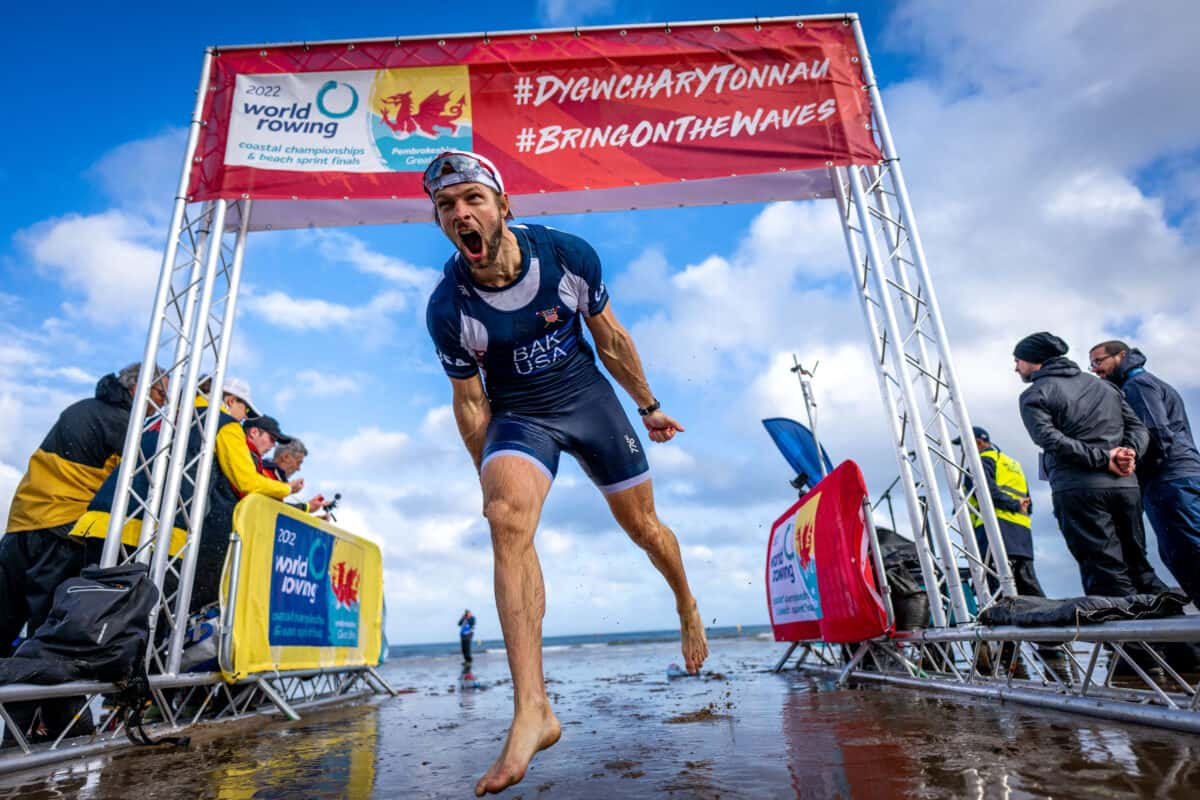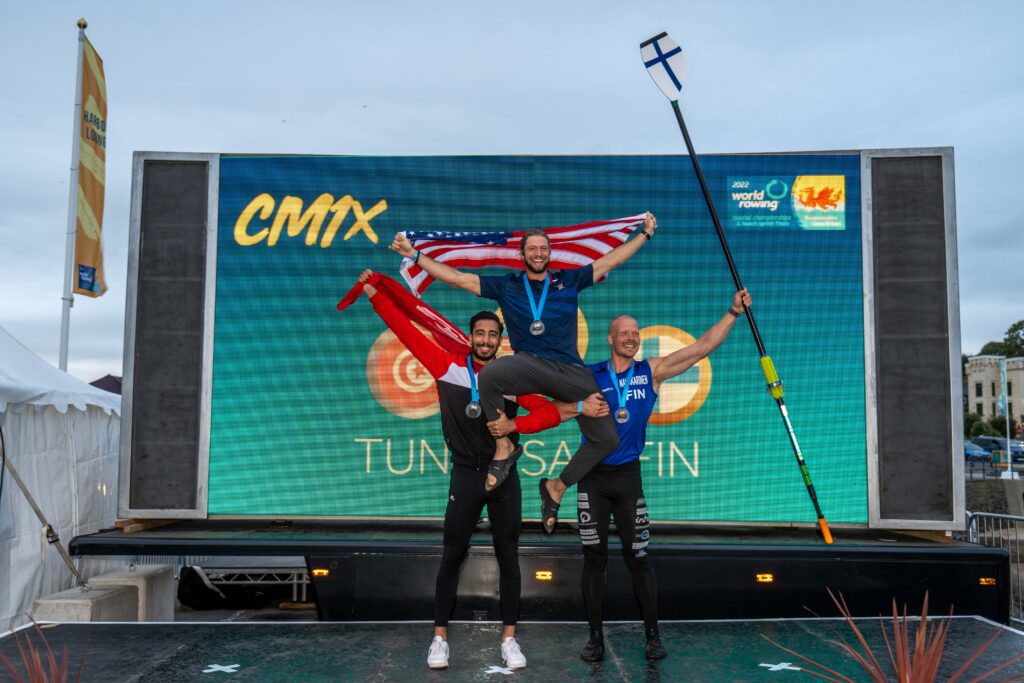
17 Jan 2023
January 2023 - Christopher Bak
On the morning of the Men’s Solo Last 8 of the 2022 World Rowing Beach Sprint Finals, Christopher Bak of the United States of America got a Facebook notification. It was a ‘memory’ – he has started rowing ten years prior, to the day.
Three races later, Christopher Bak crossed the line and slammed the buzzer in Pembrokeshire, Great Britain, to claim his first World Champion title as the 2022 World Rowing Beach Sprint Champion in the Men’s Solo. He is our January 2023 Rower of the Month.
You had a great 2022 season, capping it off with the World Beach Sprint title in Wales. Was it a pretty straightforward season for you in terms of racing and training?
That’s a loaded question. I would say as far as straightforwardness goes, I would say it was interesting, especially at the beginning of the year, I had no idea I would be able to go to Peru (for the Copa America). I was working at a previous job and that was kind of holding me back from fully committing to rowing.
So I ended up stepping away from that position and then just kind of seeing where the world took me from there knew that was going to happen. Taking the trip to Peru to kind of kick off the year and solidify even more my own kind of personal mental fortitude from that previous World Championships, and missing a buoy.
How did you first get into rowing?
I was watching the 2012 Olympics on TV and I was like ‘Oh, that’s an interesting sport I’ve never seen, never heard of’. Turns out the nearest club was like 15 minutes from my house. I was a tennis player pretty much my whole life. And I decided I wanted to add something on.
So I joined rowing and then just kind of stuck with it through the years, kind of dabbled in lightweight for a little while. At the 2021 Olympic trials for the U.S., I didn’t quite make that. And then my coach, Mark Oria, who has been my coach for about seven years now came and said ‘Oh, well, I used to do a lot of coastal rowing in Spain when I lived there. And I think you should try’. And I said, okay, so let’s try that. And then 2021 came around. I mean, it’s an amazing, amazing kind of spin on the sport.

Is it true that you started coastal rowing in a wave pool?
So… yes. We had somebody lend us a coastal boat and we were on the river just kind of making waves in with that launch and everything. But in Cincinnati, we don’t have an ocean. We don’t really have any big bodies of water, unless you go 4 hours north to Lake Erie.
Somehow we got access to the wave pool at Kings Island, which is an amusement park. And they were just like, ‘Yeah, come try!’. And you can only take like four or five strokes before you were smashing into a concrete rock, but they were really generous in that. And it was really good experience with the programme, whatever wave we really wanted. And they were open to it, which is really cool.
What do you do outside of rowing now?
Outside of rowing there’s a couple of different things that I enjoy. As far as the work world goes, I’m working for a start-up, bringing in projects in a business incubator. I work as project manager. Any ideas that nurses, clinicians, anybody in the hospital that work has, we kind of help guide them through patenting, funding, things of that nature to try to get them on their feet, start their own business. It is volunteering right now. Hopefully it will be paid sometime. Other than that, really training, but it’s likely just something I really enjoy doing a little bit of woodworking, hanging out with my family. I guess just kind of like the basic things that are just like take away, take you out of the hustle and bustle of life.
What are your upcoming goals in rowing?
Definitely going down to Peru, where the Copa America is going to be again. That’s, I think, the first big race of the season. And then next there I believe there’s going to be U.S. trials, which will be, I would say, in June. And that’s going to be not only the qualifier for the World Championships but also the Bali Beach Games. I already qualified the boat at the World Championships. But then I personally still need to qualify. So really looking forward to that. That’s kind of my top goal for the year to try to qualify for Bali and then win worlds again as well.
Do you have a favourite rowing location that either flat water or coastal beach sprints?
I really like Lady Bird Lake in Austin, Texas. That was a great, great facility down there.
I think Australia would be awesome. I was going to travel there back in 2019. Fell in love with the country and I don’t know, I think it’s a great place for coastal. It’s going to be really challenging surf.
What do you see as the future of coastal rowing?
Yeah, I think as far as the future, I definitely see it incorporating into the Olympics. I don’t know, a lot of rowers might hate me for saying this, but I actually don’t really watch rowing on TV, I try to stay out of the world if I’m not actually competing in the sport. As far as the future of the sport, I think it’s going to continue to grow and develop. And I think we’re going to see a lot more of our regional continental races and then sort of the penultimate races of the World Championships and the Olympic Games.
If you have to give one piece of advice to a rower starting out, what would it be?
Let it go. Let it run its course, let rowing run its course. It’s at the beginning. It’s very physically challenging. And I think that’s true for a lot of new rowers. And as you develop the muscles and everything, you get to a point where you’re thinking ‘When is this going to pay off?’.
For me – the same weekend that I ended up winning the title in Wales was my first world title. And on that same weekend, ten years prior was my very first regatta. It had just popped open on Facebook in a memory – ten years ago today.
And I was like, oh my gosh, that’s really funny. Whether it was the 10 000 hour rule or whatever it is. I think it’s really cool to just see that change over time and just sticking with something.
I’ll be the first to admit I was at a point when I wanted to quit, before that point where I felt like I was on top of the world. So long story short, letting it grow with time.
And what about a flat water rower? What would you say to them if they were thinking of trying coastal or beach sprints?
I guess just be flexible is a big one. And I think just accepting that mother nature has the upper end and it’s not a good thing. It’s not a bad thing. It’s just what it is.
And I think for anybody transitioning – be really excited about it, it’s going to be really challenging. You’re going to say, why haven’t I been able to put my blades in at the end? But you don’t have control over that. Sometimes you just have to row after arms only for three or four strokes during a very good race or whatever it might be.
And do you have a piece of advice that’s been said to you that’s stuck with you?
Every single race, once we got into the brackets [of the Last 8], my coach, Mark, when you sprint out to the boat and you have to jump in and everything, he just said ‘just relax’. And I think it’s really, really easy to get worked up and want to be really, really energetic and try to get off the line as fast as you can.
And all those things are still running through your head. But if you can just allow your body to take a breath, relax, get in the boat, make sure things are set. I think that’s something that will stick with me ever since that bracket race and it’s like, I think every single race moving forwards, okay, make sure you’re good to go, and then shoot off.
You and your coach Mark, you seem like you guys are really solid duo. What do you think has kept you guys as such a solid team for the past seven years?
Mark and I are best friends outside of rowing. One of my favorite things to do is to go cycling together. He’s offered like a lot of life advice. We always have dinner together and really it’s just kind of grown as an organic relationship, I don’t think. I think Mark’s coaching style isn’t one that says, ‘I’m the authority and this is the this is what we’re going to need to do’.
It’s a very collaborative experience. And that’s something that I think tons of rowers and specifically for myself, have longed for in a coach that they’ve had. And it’s just his positivity just radiates wherever he goes. It’s really just grown to be a good, really good friendship, not even just a relationship.
And I assume it’s new territory for both of you going into this coastal world, which isn’t, let’s say, as well formed as the flat water world. And there are lots of new things being thrown at you all the time. And whether it’s new innovations or your training plan, it’s probably a learning curve for everybody involved, right?
Yeah, absolutely. That’s what’s really cool about the sport in general. I think with flat water over years and years and years, and to nobody’s fault, there’s been somewhat of an elitist mentality. There could be. But in the in the coastal realm, I think it’s just so new to everybody. And it’s been around for a while, especially an endurance side.
But I think everybody’s just so accepting of it. You could have been a rower for years and years and years on end, and then you go into coastal and it’s like, ‘Oh, this is something brand new’ and it’s a learning experience for everyone. The water changes every day, the conditions change every day, and it’s never going to be to be “perfect”. So I think people accept that and it just creates a really cool, tight knit culture.
Where are you based in California?
I’m in San Mateo, just in the in the Bay Area. And so I’ll be here probably till end of April and then we’ll kind of see where the racing schedule takes us from there. I’ll pop into Cincinnati for a little while, maybe into Boston. Just staying kind of flexible, seeing where the world takes awesome.
And how does your coastal training programme compared to your flat water training programmes that you’ve done?
I think they’re definitely similar. You still have to put in all the long, long, steady state, all the meters. You’re going to have a couple sprint pieces here and there. Being able to access coastal waters and being able to incorporate that throughout the training is important, especially from the technical side of things. But as far as the work, honestly, it’s the same.

